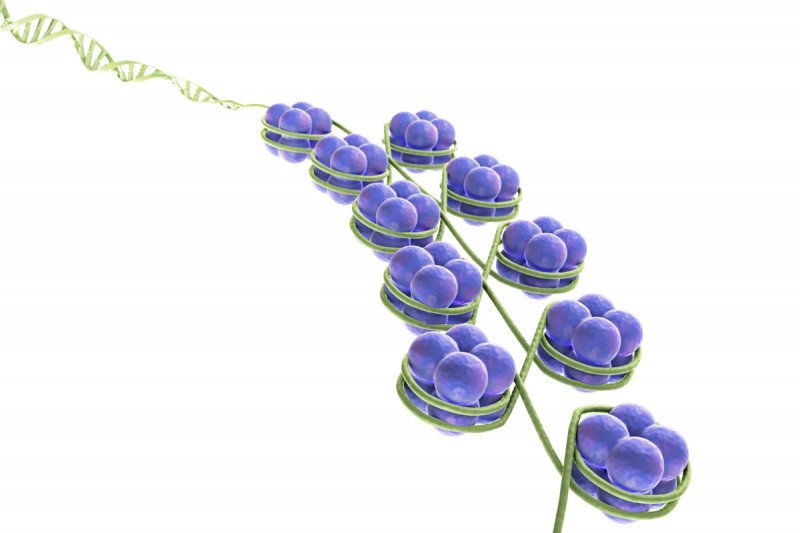
This illustration depicts DNA (green strands) wrapped around histones (purple spheres).
Genetic inheritance is most commonly thought of as the passing of genes from parent to child, and on to subsequent generations. But in fact, each time a cell in the body divides, genetic traits are passed on from that cell generation to the next. Increasingly, scientists are learning that this type of inheritable genetic alteration may not necessarily be caused by changes in the genetic code.
This is the idea behind epigenetics, which has been a buzzword in biological research for about a decade. In the most basic terms, epigenetics refers to information that is passed down from parent cell to daughter cell but is not encoded in the DNA sequence. As we learn more about it, the field is becoming increasingly important for cancer research and drug development.
Epigenetics and Cancer
Epigenetic changes are a normal part of many biological processes — for example, they allow stem cells to differentiate into more-specialized cell types — but they also can lead to cancer and other diseases.
Physician-scientist Omar Abdel-Wahab, a medical oncologist on the Leukemia Service and an investigator in the Human Oncology and Pathogenesis Program, is one of several Memorial Sloan Kettering researchers studying epigenetics specifically as it relates to cancer. He explains that we are “just at the tip of the iceberg,” but that research has already led to a handful of cancer drugs that work by targeting epigenetic changes.
Different Mechanisms, Same Result
The two most well studied types of epigenetic changes are methylation of DNA and modification of histones, proteins that bind to DNA. Although these two mechanisms are very different, the result is the same: They influence which genes are expressed, or translated into proteins. Epigenetic changes can silence genes by preventing DNA from being translated or activate genes that usually aren’t turned on.
DNA methylation occurs when a methyl group (a carbon atom with three hydrogen atoms attached) is added to a DNA strand. If methyl groups attach to genes crucial to regulating proper cell growth and division — preventing those genes from carrying out their normal functions — methylation can lead to cancer.
Histones are proteins that DNA wraps around like yarn on a spool. “They regulate how tightly or loosely the DNA is wrapped. If that yarn is wrapped too tightly, it won’t be able to unspool, and the genes encoded on it will not be accessible to translation,” Dr. Abdel-Wahab explains. If it’s too loose, it may activate genes that should remain silent. Chemical reactions that modify the histones can affect how tightly or loosely the DNA is wound and therefore how the genes are expressed.
“We know that epigenetic changes are widespread in cancer cells,” he says, “and there clearly are broad differences between healthy cells and cancer cells in terms of how DNA is methylated and how histones are modified. Characterizing these changes is important, because it gives us insight into the differences between the epigenomes of cancer cells and of normal cells.”
“Studying the epigenetics of cancer is especially exciting because we are discovering some of the enzymes that regulate these changes can be blocked with drugs,” he adds.
Developing Drugs to Target Epigenetic Changes
A few of these drugs are already part of standard care for certain cancers. Azacitidine and decitabine both work by inhibiting DNA methyltransferase, the enzyme that allows extra methyl groups to attach to DNA. These drugs are used for the treatment of myelodysplastic syndrome, a type of blood cancer.
Another class of enzymes that has been well studied is histone deacetylases (HDACs), which affect the ability of histones to be wrapped by DNA. One HDAC inhibitor, known as SAHA or vorinostat, was developed largely by MSK President Emeritus Paul Marks and was approved in 2006 for the treatment of cutaneous T cell lymphoma, an immune cell cancer in the skin.
Dr. Abdel-Wahab notes that there are several drugs currently in clinical trials at MSK that affect different components of the epigenome, including treatments for glioblastoma brain tumors and various types of adult and childhood leukemias.
“One of the things that’s great about doing epigenetics research at Memorial Sloan Kettering is the ability to work with and learn from patient samples, and to be able to translate research done in the laboratories into some of these clinical trials,” he concludes.










